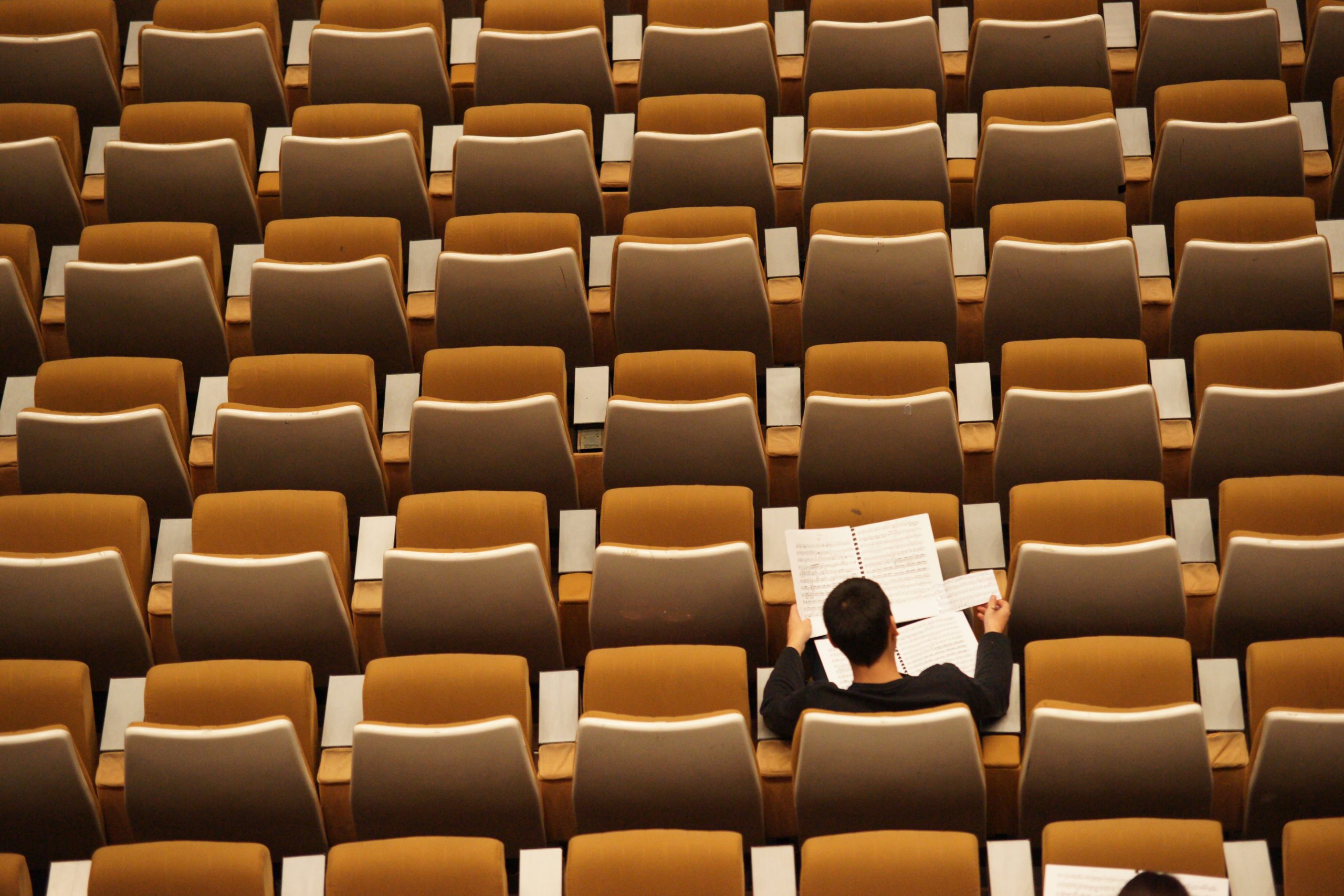

Public education must form a virtuous elite.
RECOMMENDED READING
America’s elite universities are both a tremendous asset and a menace to our country. They can be both these things at once because we ask a lot of them. They are expected to be training grounds for future professionals, gateways to economic mobility, sanctuaries for moral and philosophical exploration, havens for basic scientific inquiry, nurseries of expertise in countless fields, foundries of an educated elite, fonts of public spiritedness and civic learning, hothouses of political engagement, and lots more. These are all legitimate aims, even if they are not all equally worthwhile, and our universities succeed or fail at them to differing degrees. So those of us inclined to agonize over what happens now on campuses need to be specific about what American higher education is failing to do well.
The formation of elites would have to be high on that list. It’s an uncomfortable subject for Americans, because we think the whole idea of elites somehow violates our democratic ethos. But “elite” almost describes a tautology: Whatever a society’s frameworks for ascension to influence, power, and wealth, some people will rise and some will not. Those who do rise are that society’s elite, because they have risen. Every society therefore has its elites. The question is how they are chosen, formed, empowered, and constrained. Who gets what privileges of power and status, and on what grounds?
Until relatively recently, the United States had a genuine plurality of elites, which was generally good for our democracy. The people who ran major corporations were different from the people who taught in universities, who were different from those who staffed federal agencies, produced Hollywood movies, wrote for major newspapers, or led labor unions. These groups of elites were likely to have meaningfully distinct educations, religious affiliations, political tendencies, and cultural affinities.
“There is now a discernible American elite class with its own cultural character, and it is in charge of most major institutions—except for those to which you have to be elected, which it controls only about half the time.”
Today, all of those elites are likely to be much more alike. They probably all think fairly similarly about religion, culture, politics, and much else. There is now a discernible American elite class with its own cultural character, and it is in charge of most major institutions—except for those to which you have to be elected, which it controls only about half the time.
How this has happened, and how it could change, are questions that run to the core of the evolution of our culture in recent decades. But any effort to restore or recreate some diversity of elites would have to start with the reality of their consolidation and work to imbue different elite-run institutions with distinct modes of integrity and legitimacy. Such work would have to begin as better formation of the elite we have, and so by recognizing that different sectors of American society no longer really have their own elites because there is just one elite, and it is increasingly becoming its own sector of our society.
The university is at the center of what defines this elite class. Its members not only all went to college but most attended one of the top 5% or so (that is, roughly the top 200) of America’s universities. Whether they like it or not, these top schools—which include public and private institutions, large and small—are where our elites are formed, and so they have an obligation to think seriously about elite formation.
Of course, that’s often the last thing they want to think about. The American academy has long been uneasy about its own relationship to our society’s leaders. Half a century ago, in his brilliant 1971 book The Degradation of the Academic Dogma, sociologist Robert Nisbet described American academics as “an aristocracy masochistically tormenting itself with the slogans of a revolutionary democracy.” There is still much truth to this description, but as America’s elites have consolidated, the American academy’s willful dereliction of responsibility has only become more pernicious.
Its failure threatens elites themselves as much as the institutions in their charge. The growing cohesion and malformation of American elites contributes to the dysfunctions of our broader culture and has drawn a powerful populist reaction rooted in profound resentment and mistrust. Any effort to restore trust must take seriously the unspoken but necessary task of more public-spirited elite formation and so must build institutions of elite higher education more committed to it.
Aristocracy by Other Means
Our leading universities avoid thinking too hard about elite formation by pointing to the ideal of meritocracy, which implies that elites are selected, not made. This ideal was born of a noble desire for greater fairness and social mobility: It sought to admit people to institutions of higher learning not by virtue of their birth into the ranks of the WASP gentry but in accordance with some measure of aptitude that might be quantifiable through standardized testing. Able students could thus be plucked from a variety of backgrounds and given the opportunity to rise as high as their talents could take them.
The meritocracy succeeded on these terms, at least at first. Although family-legacy admissions continue and the WASP lines are still overrepresented in top schools, there is no doubt that today’s American elite is far less narrowly drawn in terms of race, ethnicity, religion, and sex. This has opened opportunities for able Americans from many backgrounds, diversifying at least the demographic roots of our educated elite dramatically and for the better.
“Our meritocracy is plainly rearranging itself into a more familiar aristocratic pattern, which leaves the larger society less and less persuaded of its claim to legitimate authority.”
These elites of different backgrounds nonetheless do have one thing in common: They all measure up by the standards now said to represent merit. Yet those standards are not by any means self-evidently suited to supplying us with an able and legitimate leadership class. As graduates of leading universities have come to populate the leading ranks of many more sorts of institutions than the WASPs ever ran, the standards of admission to these schools are now made to bear much more weight than they can support. And, noble though the desire to democratize higher education may be, meritocratic standards cannot nullify a simple and unchangeable fact about elites: They are inherently narrow and exclusive.
In fact, our meritocracy has turned out not to be able to avoid even the tendency of elites to become outright aristocracies—that is, to transmit privilege generationally. Thanks to both assortative mating and the powerful incentives to game the tests that grant entry into top-tier colleges, children whose parents are in the upper echelons of our society have a very strong (and growing) chance of finding themselves in those upper echelons as adults. As William Deresiewicz has noted, the portion of students at selective colleges whose families are in the top quarter of income earners in America rose from roughly 45% in 1985 to more than 65% by 2015. Our meritocracy is plainly rearranging itself into a more familiar aristocratic pattern, which leaves the larger society less and less persuaded of its claim to legitimate authority.
SATs and the License to Rule
What is worse, this new aristocracy is in some important respects less reticent about its own legitimacy than the old. Because each of its members must prove his or her merit in order to gain entry to the most exclusive schools, today’s elite is more likely to believe it has earned its power, and possesses it by right rather than privilege. Such merit is demonstrated by test scores and a glittering resume and is then often put to use in various forms of management and administration. The sort of elite this meritocracy produces implicitly substitutes a cold and sterile notion of intellect for a warm and spirited understanding of character as its measure of worth.
Our society, including some elites themselves, cannot escape the sense that this is an unjustifiable substitution. But rather than impose tests of character on itself, our elite responds to these concerns with increasingly intense displays of its ideal of social justice. It might adopt the language of privilege in its critiques of the larger society—and sometimes also in its masochistic torment of itself. Yet it does so without offering any means of persuasively legitimating privilege beyond pushing for more inclusive criteria of admission to elite institutions.
“The sort of elite this meritocracy produces implicitly substitutes a cold and sterile notion of intellect for a warm and spirited understanding of character as its measure of worth.”
These efforts miss a simple point. Americans have grown skeptical of our elite’s claims to legitimacy not so much because it is too hard to enter the upper tier of American life (even if it is) as because those in that tier seem to be permitted to do whatever they want. Our elite is increasingly guilt-ridden, and the broader democratic public is increasingly cynical about its leaders, not so much because too few Americans attend elite colleges as because those who do too often go on to exercise power in our society without enough restraints. The problem, in other words, is not necessarily the standards for entry, but the lack of standards upon entry.
Precisely because our elite does not think of itself as an aristocracy, it does not believe itself to need standards or restraints. But in a free country, trust in those with power is often a function of evident restraint—of a reason to think that a person making a claim to authority is bound by standards that effectively render him an agent of the larger society. Ironically, to strengthen its case for legitimacy, our elite might have to understand itself more as an aristocracy. As Helen Andrews has argued in an essential essay on this subject, “the meritocracy is hardening into an aristocracy—so let it. Every society in history has had an elite, and what is an aristocracy but an elite that has put some care into making itself presentable?”
What would it mean, though, for our elite to make itself presentable? It would surely require some sense of what has made it unpresentable to begin with. And our meritocracy has lacked that sense. We have implicitly mistaken an idea of merit meant to broaden the entry criteria into elite institutions for an idea of merit that could justify and legitimate authority. But authority is not legitimated merely by the ways it is obtained. Often more important in the end are the ways in which it is used.
A New Ethos for Elite Education
Here there is a crucial role for the elite universities. They must see it as their task to shape leaders who grasp that their privileged position comes with obligations to the larger society, who respect and take seriously that larger society, and who are taught to understand themselves as agents of their fellow citizens hemmed in by civic and professional constraints.
To begin with, this would need to involve an explicit emphasis on character formation and the inculcation of responsibility. Elite universities should not encourage the already prodigious self-regard of their students but should rather seek to temper and direct it. They should stop viewing those students as customers, and should see them instead as rising leading citizens who require formation in a sense of gratitude, commitment to the fate of the country, and restraint in the use of power. They should work with their students’ healthy discomfort with privilege, but in a way that points them toward channeling their advantages into obligations rather than rendering those students into permanent hypocrites who pretend to be powerless outsider critics while running all the country’s major institutions.
“What universities offer their students is not best understood as an opportunity to be exposed to, or participate in, unrestrained expression. It is better understood as directed formation pursued through teaching and learning.”
This was the purpose of a great deal of the culture of our top universities prior to the last half century or so. It came to be dismissed as a mark of privilege, but it was frequently a significant (if always imperfect) constraint on the abuse of privilege. In essence, the university needs a different approach to imbuing moral purpose into its graduates. When today’s academy does think about how to form its students as elites, it tells them to set themselves apart from the larger society, which is corrupt and wicked and needs leaders who will transform it despite itself. A more worthy approach to elite formation would help students see themselves as part of that larger society, which is dynamic and vigorous, rooted in deep human truths, and capable of greatness given leaders who will serve as able stewards of the public good. To speak of that society in terms of “we” and not “they” would be a start.
This would also demand a different attitude from critics of the university, of course. To see higher education as a potential source of worthy leaders in various arenas of American life would require a recommitment to the promise of the university, not a rejection of its potential or an insistence on turning the academy into yet another platform for free speech. What universities offer their students is not best understood as an opportunity to be exposed to, or participate in, unrestrained expression. It is better understood as directed formation pursued through teaching and learning.
Beyond explicit character and civic education, then, traditional liberal education also has a crucial role to play in shaping our leaders. An elite worthy of the name requires an appreciation of the strengths and virtues of its society, and also some tools for grasping its weaknesses and vices—a way to see beyond the din of popular culture in both senses. That demands some exposure to the best of our traditions through the study of history, philosophy, religion, art, and literature. Our leading universities should at least make a serious effort to expose their students to liberal learning of a sort well suited to cultivating some appreciation of these.
A Time to Build
Needless to say, the ethic that now dominates elite higher education in America could hardly be further removed from the project of such public-spirited elite cultivation. Our leading universities are nowhere near understanding their obligations this way, and we should not expect that to change any time soon. But seeing what they lack and what they are getting wrong can inform our criticism of them—which is now too often unfocused or misdirected—and can strengthen efforts to build virtuous pockets within them where there are opportunities to do so and to develop alternatives to them that might better serve to form American elites.
Despite the fact that our elite is consolidating and its power is growing more concentrated, we are probably also entering an era of innovation and competition in American higher education. The sorts of frustrations that led to new schools being launched in the late 19th century—schools like Johns Hopkins, Stanford, the University of Chicago, and more—have emerged again and with even greater force. Some alternatives are already appearing, like the recently announced University of Austin. More will surely emerge in the decades to come, both public and private.
Tomorrow’s new institutions will not displace today’s elite schools, but they stand a chance of both joining and changing them, as some of those new universities of the late 19th century did. It is critical that these new paths be pursued with a sense of what a great university, and a worthy elite, could achieve for America, rather than just a sense of frustration and resentment about those we have now.
Rather than retreat from responsibility, our elite universities need to show rising generations how to embrace it. Rather than just rail against privilege, they should teach their students how to earn and deserve it.
Recommended Reading
Conservative Scholars Rethink Public Education’s Purpose
PRESS RELEASE—Essay series explores how public education is failing in both practice and principle
The School of Self-Rule
Public education must empower the common citizen.
Foreword: Teach for America
Public education’s primary purpose is preservation of our democratic republic.












